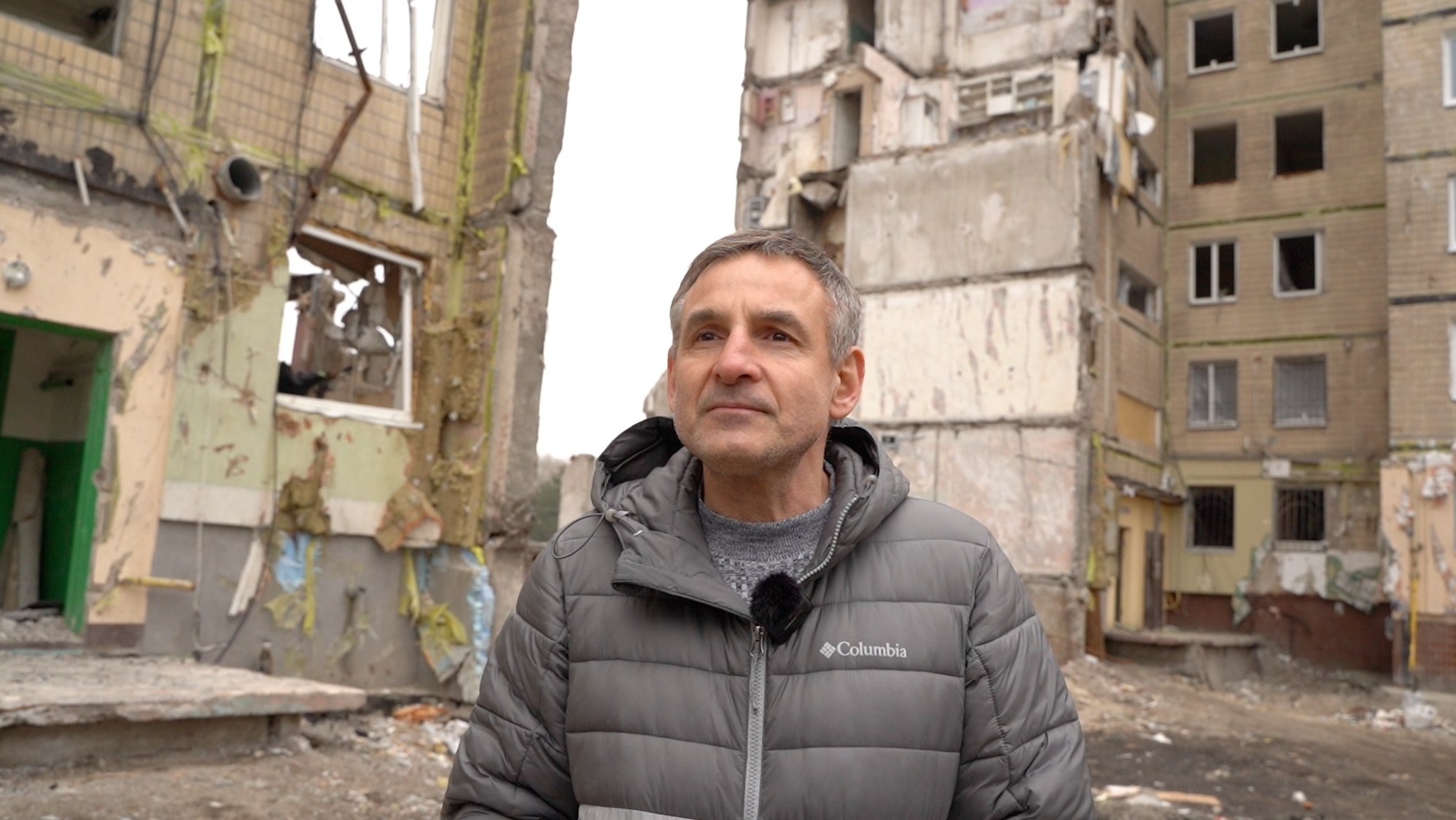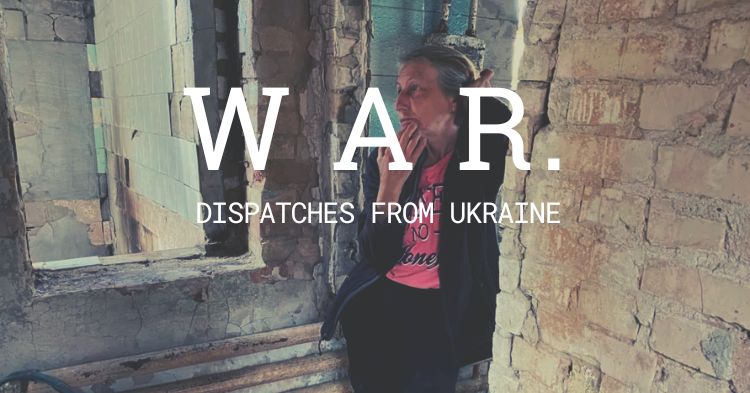Fake babushka protesters: a blast from the past
The night before the protest, I walked to the building of the Parliament of the Republic of Moldova, an imposing Soviet-style building in Chisinau. Due to the ongoing energy crisis, this part of Stefan cel Mare Boulevard, the central street of the Moldovan capital, was pitch-dark, lit only by the full moon, and completely empty. Only crows flew over the former Communist party headquarters.
Just a few steps away further down the street, the lights were on, though, and a buzzing crowd of fashionable young people enjoyed sweet liquor at a Ukrainian bar Piana Vyshnia, translated as Drunken Cherry, to the sounds of blues.
It was a crisp Saturday night, and families enjoyed delicious-looking cakes in cafes—Moldova is famous for its pastries. A burger joint featured impressive juicy cheeseburgers and kids ran around, laughing.
The next day, November 6, this very street turned into a scene from the Soviet Union circa 1980.
Thousands of babushkas (“grandmothers”) arrived at the rally intended to bring down the current government of Moldova. They limped around, leaning on walking canes, or sat around, huddled along the curb like pigeons.
The sight brought back a childhood memory: an endless, silent queue of old women lined up for milk, empty tin jars in their hands, the same despondent expression on stern faces.
A few younger people with Moldovan flags and posters “Away with President!” walked around but almost no one answered my questions, “Why are you here? What do you demand?”
One woman did explain that white chrysanthemums and the plastic funerary arrangements that protestors carried were “for the President’s funeral.” The other one said that they wanted “a good government,” and that “gas was expensive.”
Others turned away, visibly scared, and covered their faces with headscarves.
Their scarves, bright orange and green with floral patterns, yellow-red-blue flags, and garish funerary wreaths were the only splashes of color in the otherwise grainy grey, like an old newspaper photo, scene: shabby buildings in scaffolding, police in black uniform, cold November sky.
The speakers screamed from a platform, occasionally in Russian, about the greatness of the USSR tradition and the decaying West.
It could have been an obligatory November 7 parade, the Great October Socialist Revolution anniversary, in the 80s—another flashback from my childhood.
In the USSR, of which Moldova was a part until the end of the Soviet empire in 1991, schoolchildren, students, and employees of state enterprises—and there were no non-state enterprises—marched for hours on major state holidays, under the fear of being expelled or fired.
Whoever could get hold of alcohol, sweetened the ordeal. By night, the streets were covered with motionless bodies and squished carnations, like battlefields.
In Chisinau, in 2022, only a few drunks roamed around: babushkas sat and stood, waiting for something.
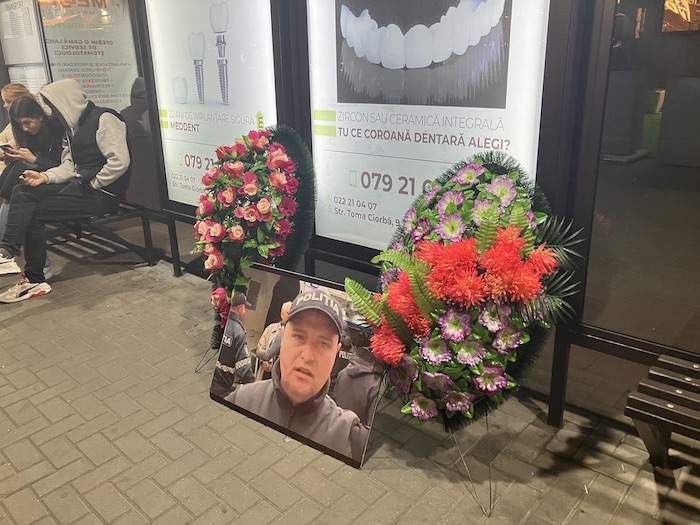
By four thirty in the afternoon, the scene changed again, and drastically. Suddenly, the whole rally took off, walking—almost running—away from the Parliament. Even those walking with canes developed quite a speed. The crowd was so dense that stray dogs, ran off the pavements into the street, whimpering with fear.
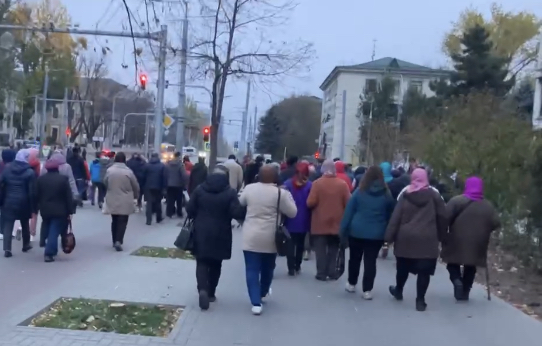
After about twenty minutes of brisk walking, the procession broke into smaller groups that, one by one, turned into side lanes. Muscular men in camouflage clothes directed people to coach buses and mini-buses parked on both sides of narrow streets. Soon, a convoy of buses rolled out of town, taking the protestors home.

I walked back downtown, past the plastic funerary wreaths and posters left on the ground and at the bus stops. The Drunken Cherry bar downtown re-opened. The aroma of cheeseburgers hung in the air. Young people filled the cafes and bars.
A couple of kids ran their scooters over the white chrysanthemums on the asphalt and past the mound of funerary wreaths at the corner. Crows circled over the Parliament.
Fear of Russia's FSB in Moldova
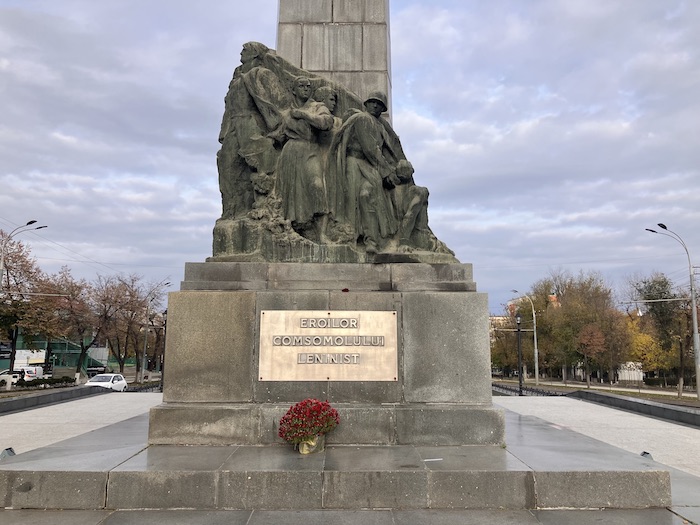
A specter of communism is still haunting Europe in 2022. The babushkas bussed from villages are not the only people who are afraid to speak freely in Moldova. The fear that had dominated every aspect of public and private life in the USSR still lives in an independent country aspiring to become an EU member.
Many residents of Chisinau declined to speak to Euromaidan Press about the protests, explaining that they feared for their job security.
One businessman in his late 50s asked not to be named and admitted that he and his family worried about the Russian Federal Security Bureau (FSB) as it had infiltrated the Republic of Moldova.
Several middle-aged, educated Moldovans preferred not to speak on the record for the fear of the FSB. Off the record, many shared that they do not support Putin’s foreign policy and the war in Ukraine.
S., a successful lawyer in his 40s, used to be a Putin supporter until recently but, appalled by the Russian war crimes in Ukraine, changed his views. He now tries to convert his pro-Putin relatives.
A family of medical doctors in their 50s had to turn off heating and gas in their apartment as they could not afford to pay the bills but expressed their support of the pro-EU government, faith in Moldova’s European future, and solidarity with Ukraine. They said that the protests were organized by a pro-Russian opposition party and that the Russian presence is substantial in Moldova.
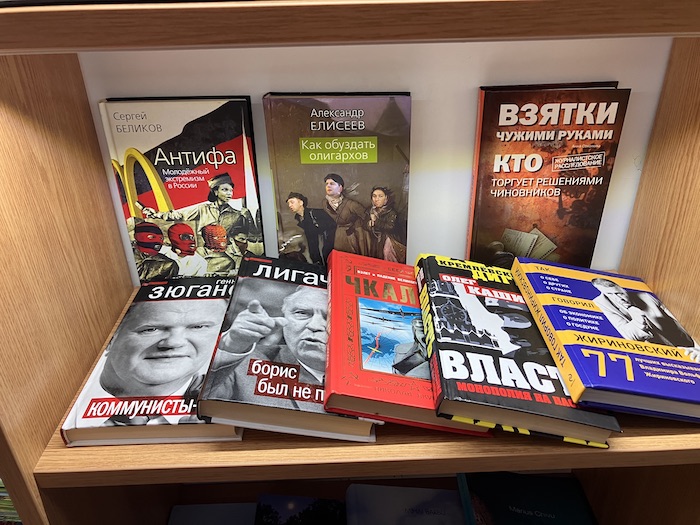
The situation is aggravated by the situation with Transnistria, a breakaway state controlled by Russia.
In the 90s, after a brief but intense armed conflict, Russian “peacekeepers” were stationed in Transnistria and the Russian military is still based there. Their exact number is unknown but a few sources believe it was under 1,500 personnel.
Transnistria is a mini-USSR, with pro-Russian authorities and the Kremlin-brainwashed population. Tiraspol, the “capital” of Transnistria, is only an hour's drive from Chisinau, and Moldovans believe that the FSB has no problems permeating their society.
The younger generation of Moldovans, however, has parted ways with the old Soviet mentality, the Russian language, and the fear of the FSB.
Alex, an IT expert in his 20s, whose native language is Romanian, Moldova’s state language, said in an interview that young people strongly resisted the attempts of the Russian Federation to undermine the democratically elected pro-European government.
The youth is aware of the pro-Kremlin parties' strategy: exploiting the economic difficulties and rising gas prices to promote the need to return to the Russian sphere of influence.
“Russia wants to involve Moldova in its war in Ukraine and is trying to destabilize the situation,” he said. “The young people have chosen a pro-European path. We support Ukraine and we want to become a part of the EU.”
Communists and oligarchs in Moldova
This ambivalence might not be a part of Moldovan national identity but, rather, the result of unfortunate historic developments.
After the fall of the USSR, Moldova gravitated to the West but its pro-Kremlin governments stuck with the Russian gas.
In 2001, the head of the Communist party and a former Minister of Internal Affairs of the Soviet Republic of Moldova, Vladimir Voronin became the President of Moldova. Only three years into independence, the country was under Russian influence again, trying to build a communist state.
Instead of communism, though, the oligarchic system was born.
A communist presidential office consultant, allegedly an owner of a clandestine prostitution chain, Vladimir Plahotniuc took full control of the country’s economy. He ran the whole state like his own gas station until 2019, when, in a rare case in Moldovan political life, the members of several parties united against the oligarch and forced him to leave the country.
It is Plahotniuc’s associate, another Moldovan oligarch, Ilan Shor who is the organizer of the 2022 protests in Chisinau. With the money Shor has inherited from his influential father, he quickly developed his own sphere of influence and in 2015 founded the Shor party, partially to get immunity.
The Mayor of Orhei, a small town in Moldova, Shor gains popularity among his electorate by funding a few social security projects.
When in September four Moldovan journalists infiltrated the protestors, they found out that many protestors were bussed to Chisinau from Orhei. Shor party activists and leaders hire the Orhei residents offering L400 ($82) for a day of protests.
Shor cannot be present at the rallies as both Plahotniuc and Shor are fugitives. Accused of the “theft of the century” also known as the “one billion dollars scandal,” they live abroad to avoid arrests.
Further investigation showed that Shor, however, is not the main force behind the paid protests.
Oligarchs and the FSB
In early November, eight Shor party activists were detained on suspicion of organizing mass riots. The police seized L380,000 ($20,000) in cash, allegedly intended for the monetary compensation of the hired protesters and their transportation to the site.
Moldovan outlet RISE in cooperation with Dossie ran a detailed account of Shor’s involvement with the FSB.
They have included the analysis of the current situation in Moldova created by an FSB-affiliated consulting group. The analysts offered three scenarios of capturing the country, namely:
- forming a corridor to Transnistria through southern Ukraine, with the subsequent recognition of the region (at the moment, Russia does not officially recognize its independence);
- the capture of the whole territory of Moldova;
- and access to the borders of Transnistria without recognition of its independence.
However, these scenarios were assessed as too risky and instead another method was suggested.
The Washington Post published an investigation into Shor’s ties with the FSB and the Russian government:
“One senior Russian politician praised the protest organizer, Ilan Shor, as 'a worthy long-term partner' and even offered the Moldovan region led by Shor’s party a cheap Russian gas deal, according to Shor’s press service. Referred to as 'the young one' by Russia’s Federal Security Service (FSB), the 35-year-old Shor is a leading figure in the Kremlin’s efforts to subvert this former Soviet republic, intelligence documents, and interviews with Moldovan, Ukrainian and Western officials show.
The documents — part of a trove of sensitive materials obtained by Ukrainian intelligence and reviewed by The Washington Post — illustrate how Moscow continues to try to manipulate countries in Eastern Europe even as its military campaign in Ukraine falters. The FSB has funneled tens of millions of dollars from some of Russia’s biggest state companies to cultivate a network of Moldovan politicians and reorient the country toward Moscow, the documents and interviews indicate.”
In November, the US Treasury sanctioned
Shor, his wife, a Russian citizen and a pop singer decorated by Russian President Putin, along with a number of Moldovan and Russian politicians and businessmen involved in Shor party activities, for the attempts to destabilize the situation in the Republic of Moldova.
Sandu government's predicament
FSB's active measures are only a part of the hybrid warfare arsenal used by the Kremlin in Moldova.
Losing the ground war in Ukraine, the Russian government weaponizes the natural resources to demoralize the population of Moldova.
In November, it reduced the natural gas supply to Moldova by 50%. Electricity became a major leverage, too. In a controversial arrangement, Moldova used to buy 70% of its electricity from Russian-controlled Transnistria. When the Russian state-run energy corporation Gazprom stopped supplying the resources this month, Moldova faced a major problem just as the temperatures dropped.
In addition, Ukraine’s infrastructure suffered massive damage as a result of the Russian airstrikes. Ukraine stopped supplying electricity, which accounted for the remaining 30%.
Moldova had to turn to Romania to buy electricity at the international market prices—a major blow to the budget of the poorest country in Europe.
Despite the daring circumstance, the current government of Moldova works hard on measures to address the energy crisis and prevent a return to the past.
“If people cannot afford food, the fake protests can turn into a genuine revolt,” said a member of the Moldovan Parliament Eugeniu Sinchevici, in an interview with Euromaidan Press.
According to him, a large supplement to the annual budget is about to be adopted. The goal is to cover the energy bill aid to the population. Budgetary support from the EU and the US would help to deal with the deficit such measures will inevitably create.
The administration is actively looking for renewable sources of energy and is working on diversifying the suppliers.
The pro-EU government faces more than just a major energy crisis and an external danger.
Fulfilling the main campaign promise to fight corruption, Sandu’s administration got rid of the old, corrupt team but finding a new one, non-corrupt and professional, turned out to be extremely challenging, said Vlad Loghin, a Deputy Minister of Agriculture and Food Industry of the Republic of Moldova in 2014—2016 in an interview.
With almost one-third of Moldovan's 3 million population residing abroad, hiring competent staff is a tough mission.
“I used to work in the Ministry of Agriculture at the time when President Sandu was the head of the Ministry of Education. She is tough to deal with, non-compromising, and definitely the most decent, honest person who had never stolen a penny in her life. She is smart, Harvard-educated, and her main problem is to find people with matching skills,” said Loghin. “The current government is in a predicament. With the war next door and an economic crisis in Europe, the situation is hard.”
Eugeniu Sinchevici said,
“Even though Russia does everything to destabilize the situation in Moldova, our spirit is still strong. We still believe that we can become a part of the European family. We still believe that it is worth fighting for.”
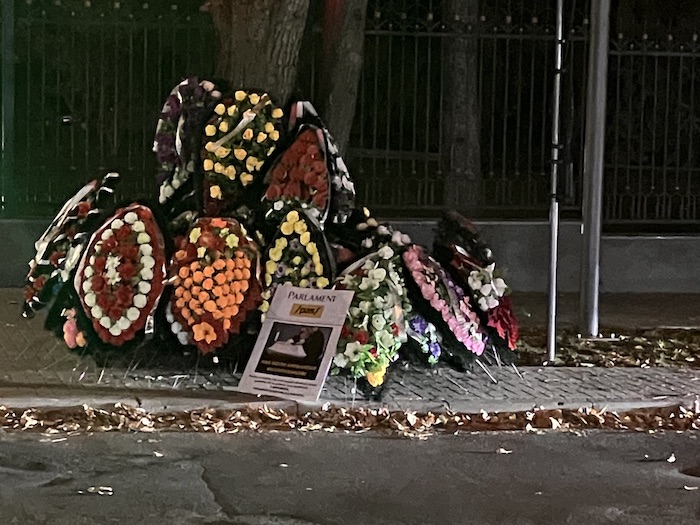
Related:
- What Surkov’s hacked emails tell about Russia’s hybrid war against Ukraine
- Ukraine-Moldova train relaunched after 24 year break
- Ukraine, Georgia, Moldova sign joint declaration on coordinating actions to receive EU membership prospects
- Ukraine helps Moldova regain control over border in Transnistrian region
- The post-Soviet oligarchy and how it shaped national state politics | 30 Years of Freedom, p.2



